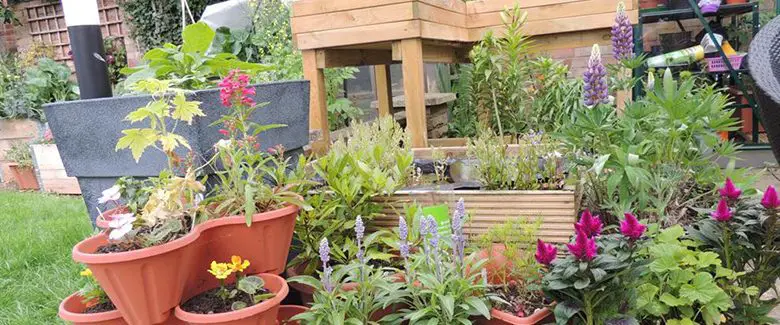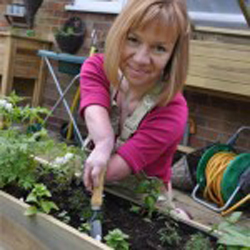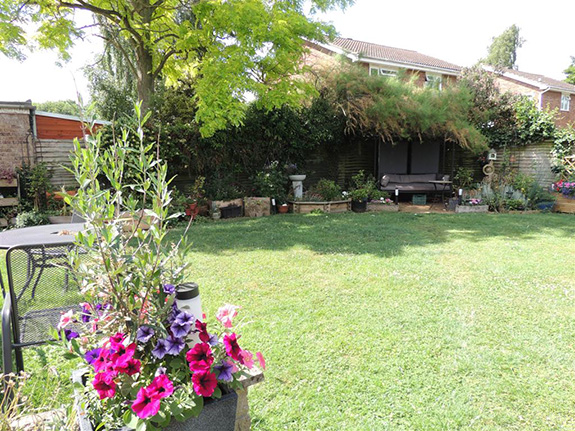
Top tips for disabled gardeners
Are you a gardening enthusiast, or parhaps want to start gardening? Niki Preston, also known as the Two Fingered Gardener, talks to Disability Horizons about her passion for gardening, and her successes, offering tips for other disabled gardeners.
My name is Niki and I was born with Phocomelia, so I have 2 fingers on my right hand and a tiny little one on my left arm. Both my arms are short and do not bend at all and just for good measure I also have dodgy hip and knee joints. I am married to the lovely James and we have 3 grown up children and an assistance dog called Bailey.


Gardening has also led me down a completely new path, so to speak, as I now enjoy sharing my gardening tips by writing about how I garden, even though my disability makes it quite difficult. I have learned to become very creative and now I feel it is time to share this with others.
Hopefully I will also inspire people to give it a go, or to start again if they have given up through adversity. Having featured in Amateur Gardening magazine, The Guardian, BBCouch! Garden News, Audacity and now Disability Horizons, I hope I am beginning to spread the word. Product testing accessible garden tools has also begun to take off so I hope you might find some useful handy tips and ideas…
Firstly, don’t worry about lack of space. Any space can be made into a garden. You can use pots, window sills, anywhere in fact, even your dining room table, which I do a lot. Raised bed gardening is by far the best, no back breaking bending work, and they can be placed at the correct height for you, so wheelchair access is perfect, too.
I grow all my flowers, veg and herbs in raised beds, all mixed in together. The effect is quite something and there is always something to look at and tend too. Give a little bit of consideration to your individual capabilities and what you feel you can manage, such as long term plant care, dead heading, pruning, that kind of thing. Everything is possible with a bit of determination, which we all have in spades (excuse the pun), and the right tools for the job.
In my quest to find tools for the disabled gardener I have been sent some amazing products, not all of which were designed with disability in mind, but I have found they are all useable in one way or another.
One set of tools that I have found really handy are children’s sized trowel and forks. Darlac make a superb set with bamboo handles, making them very lightweight. They are also very good quality as they have been made in exactly the same way as the full sized product, unlike other children’s garden tools, which are more like toys than tools.
These tools feel smooth and are so easy to carry about. Because they are so strong they can be used all over the place – my husband keeps running off with them, he thinks they are great!


These dungarees are covered in handy pockets, even a great removable one for your mobile that can be put anywhere on the dungarees, making access to it simple and quick if the need arises. I tend to fall over a fair bit and being able to have my phone with me whilst I garden has made me feel much safer.
The other pockets are a good size and can be filled up with all your tools for the task ahead, small pruning scissors, your Darlac hand tools, garden wire. There is therefore no need to keep going up and down the garden to get what you need, it is all with you already.
They are so comfy to wear too as there is lots of room for moving, bending, twisting etc. The pockets and comfy aspect could be a real benefit to wheelchair users as well.
My advice to a beginner is to do a little research into the kind of plants that you like and make sure you can manage them. Perennials are perfect to start with; they come back every year and need less constant care and attention, mostly a bit of deadheading every now and then.
Self seeding flowers such a Cosmos, Aquilegia and Verbena Bonariensis, all favourites of mine, give a great splash of yearly colour, and because they self seed, the cost of having a colourful garden is kept to a minimum. If they are grown in pots and raised beds they are much easier to keep under control, too.
Bulbs are a useful garden staple, just push them under the soil and wait for them to do their thing. What could be simpler or more satisfying than time spent lost in your own little world, no worries, some piece and quiet and fresh air to blow those cobwebs away?
Gardening – to me anyway – is very therapeutic; it lifts my spirits whenever I have bad days. I get totally lost in myself and it is probably the only time I can forget about constant pain, where I am free to be just me. After all, a garden is not judgmental, it just rewards all your love and care with beauty, colour and yummy veggies.
If you need any more advice or just want to know more about me and the other products I have tested, please do not hesitate to contact me. I can be found on Twitter @nikijrp and Facebook where I have my own page, The Two Fingered Gardener.
By Niki Preston
Check out…
- Paralympic Games: keeping the flame burning
- Accessible tour around the Houses of Parliament
- Photography: capturing life and the world we live in
Get in touch by messaging us on Facebook, tweeting us @DHorizons, emailing us at editor@disabilityhorizons.com or leaving your comments below.
It’s is great to see that nothing is holding you back from
enjoying your garden. One extra thing that can be added is the use of synthetic grass. Not only does it look good but it is
low maintenance too so it leaves more time to look after normal
plants for those that might find tending to a large lawn difficult.